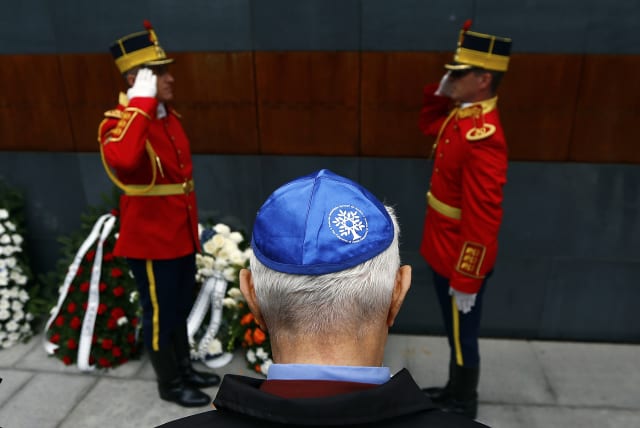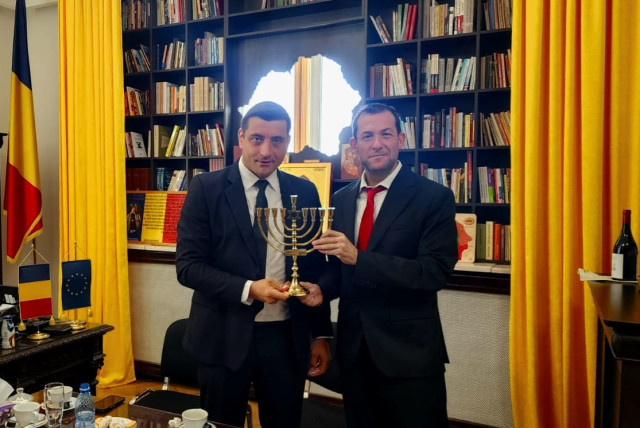Israel's Yad Vashem seeks Romanian accountability for Holocaust - exclusive

The Jerusalem Post has learned that Yad Vashem had outlined four crucial expectations for any engagement with the far-right Romanian leader.
Israel’s official Holocaust memorial, Yad Vashem, issued on Tuesday an internal document outlining four essential principles for a leader of a far-right Romanian party, urging an acknowledgment of Romania’s role in the Holocaust, ahead of Monday’s meeting between MP George Simion, the head of the Romanian AUR Party (The National Liberal Party), and Israeli Ambassador Reuven Azar.
This comes amid increasing concerns over the behavior of some AUR Party members and has ignited discussions on the recognition and treatment of Holocaust narratives in current European politics.
While Yad Vashem has not publicly commented on the meeting, it conveyed its disapproval to both the Foreign Ministry and the Israeli ambassador to Romania, due to concerns over the behavior of certain AUR Party members. The Jerusalem Post has learned that Yad Vashem previously participated in discussions about a potential visit by Simion, and had outlined four crucial expectations for any engagement with the Romanian leader.
A document shared with the Post reads, “Our embassy in Bucharest sought our perspective on the anticipated remarks of a Romanian political leader concerning the Holocaust and antisemitism.” This document delineated four essential principles for any future statement.
- First, there should be an acknowledgment and acceptance of responsibility for the Holocaust of Romanian Jews.
- Second, the Romanian-initiated and executed genocide during which hundreds of thousands of Jews perished must be addressed. This includes specific mentions of massacres led by Romanians.
- Third, a condemnation of antisemitism, acknowledgment of its existence in Romania, and the adoption of the International Holocaust Remembrance Alliance (IHRA) definition of antisemitism. This includes a clear denunciation of war criminals such as Ion Antonescu, who played a significant role in the Holocaust in Romania.
- Fourthly, the leader must explicitly support the Romanian government’s educational stance on the Holocaust and counter any recent dismissive remarks by party members, such as those downplaying the Holocaust as a “small matter.”
Sources within Yad Vashem revealed that Simion’s statements did not fully satisfy their outlined requirements, noting that “they only partially addressed our suggested principles.” The only issue fully embraced by Simion was his criticism of antisemitism. However, the source also agreed that the statement was an improvement over earlier versions Yad Vashem reviewed.
Romanian MP George Simion meets with Israeli officials
On Monday, Simion met with Yossi Dagan, head of the Samaria Regional Council, and Azar. Historically, Israel has hesitated in its engagements with far-right European politicians. However, some within Likud now see potential strategic opportunities in such interactions. Together, Simion, Dagan, and Azar publicly acknowledged Romania’s role in the Holocaust and committed to countering antisemitism. Moreover, Simion unequivocally affirmed the Jewish people’s historical rights in the West Bank, areas with profound Jewish heritage, as stated in a press release by Dagan.
This stance by AUR, which polls suggest might form the next Romanian government, indicates a pivotal shift in European Union politics. Dagan’s diplomatic efforts became evident from an informal meeting with Simion in January. These discussions have evolved into this official stance after over six months, all greenlit by Foreign Minister Eli Cohen.
In a separate statement, the AUR acknowledged Romania’s responsibility for the Holocaust and expressed profound regret, emphasizing the importance of preventing such atrocities against any community in the future.
The Simon Wiesenthal Center (SWC) in Israel criticized the meeting, pointing to some AUR leaders who glorify the fascist Romanian Iron Guard movement responsible for the murder of numerous Jews during World War II. The SWC concurred with the reservations held by both Yad Vashem and the Foreign Ministry experts regarding the meeting.
Dr. Efraim Zuroff, the director of the SWC Israel Office and a Holocaust historian, labeled the meeting as setting “a problematic precedent.” Zuroff elaborated in a conversation with the Post that the presence of leaders within the AUR who glorify Jewish murderers and deny Romania’s role in the Holocaust is deeply troubling. He expressed his concerns, stating, “Our government has often overlooked Holocaust distortions in Eastern Europe. While Simion might not be the primary issue, his party undoubtedly is.”
Jerusalem Post Store
`; document.getElementById("linkPremium").innerHTML = cont; var divWithLink = document.getElementById("premium-link"); if (divWithLink !== null && divWithLink !== 'undefined') { divWithLink.style.border = "solid 1px #cb0f3e"; divWithLink.style.textAlign = "center"; divWithLink.style.marginBottom = "15px"; divWithLink.style.marginTop = "15px"; divWithLink.style.width = "100%"; divWithLink.style.backgroundColor = "#122952"; divWithLink.style.color = "#ffffff"; divWithLink.style.lineHeight = "1.5"; } } (function (v, i) { });

